Report on Effective Communication Skills in Delivering Nursing Care
VerifiedAdded on 2023/04/21
|8
|2213
|307
Report
AI Summary
This report explores the critical role of effective communication in nursing practice, emphasizing its impact on building therapeutic relationships and delivering high-quality patient care. It discusses the essential components of effective communication, including verbal and non-verbal skills, active listening, and cultural awareness. The report highlights the significance of respect, privacy, and trust in fostering positive nurse-patient interactions. Furthermore, it emphasizes how improved communication can reduce medical errors and enhance patient outcomes. The report also covers the importance of education and presentation skills for nurses and underscores the need for nurses to be culturally sensitive and adaptable in their communication approaches. The study concludes that effective communication is fundamental to nursing, enabling nurses to assess patients accurately, build trust, and provide patient-centered care.
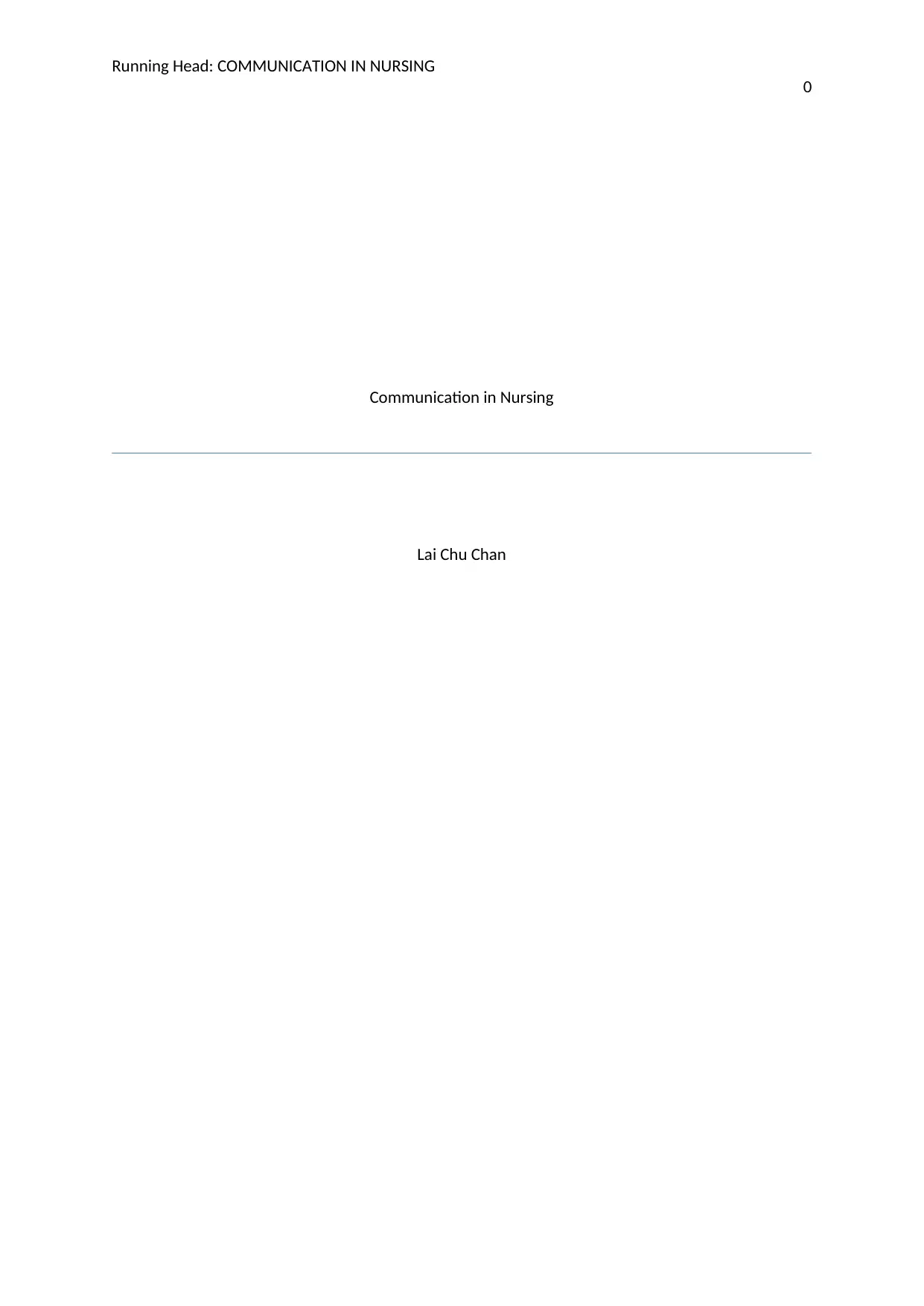
Running Head: COMMUNICATION IN NURSING
0
Communication in Nursing
Lai Chu Chan
0
Communication in Nursing
Lai Chu Chan
Paraphrase This Document
Need a fresh take? Get an instant paraphrase of this document with our AI Paraphraser
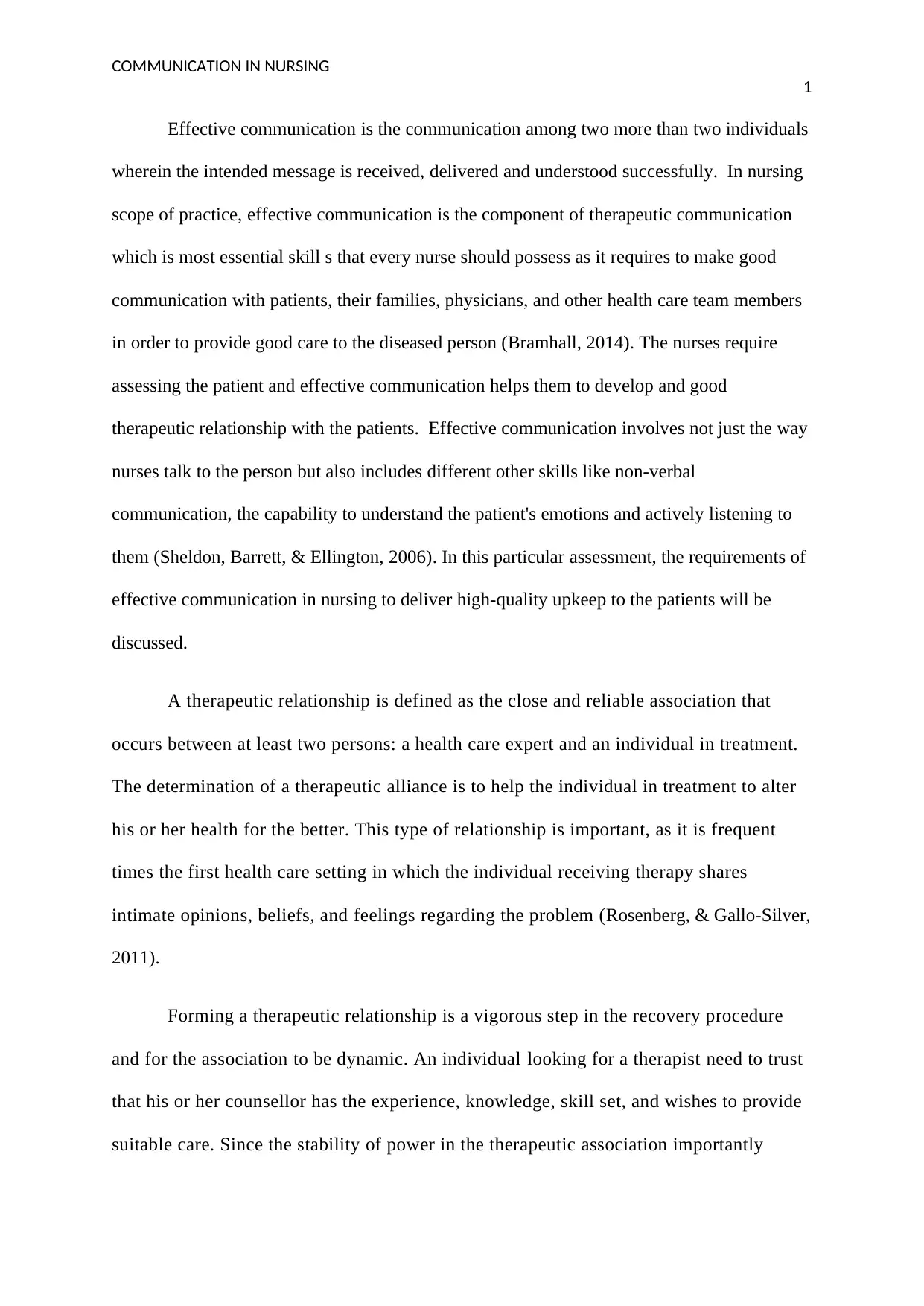
COMMUNICATION IN NURSING
1
Effective communication is the communication among two more than two individuals
wherein the intended message is received, delivered and understood successfully. In nursing
scope of practice, effective communication is the component of therapeutic communication
which is most essential skill s that every nurse should possess as it requires to make good
communication with patients, their families, physicians, and other health care team members
in order to provide good care to the diseased person (Bramhall, 2014). The nurses require
assessing the patient and effective communication helps them to develop and good
therapeutic relationship with the patients. Effective communication involves not just the way
nurses talk to the person but also includes different other skills like non-verbal
communication, the capability to understand the patient's emotions and actively listening to
them (Sheldon, Barrett, & Ellington, 2006). In this particular assessment, the requirements of
effective communication in nursing to deliver high-quality upkeep to the patients will be
discussed.
A therapeutic relationship is defined as the close and reliable association that
occurs between at least two persons: a health care expert and an individual in treatment.
The determination of a therapeutic alliance is to help the individual in treatment to alter
his or her health for the better. This type of relationship is important, as it is frequent
times the first health care setting in which the individual receiving therapy shares
intimate opinions, beliefs, and feelings regarding the problem (Rosenberg, & Gallo-Silver,
2011).
Forming a therapeutic relationship is a vigorous step in the recovery procedure
and for the association to be dynamic. An individual looking for a therapist need to trust
that his or her counsellor has the experience, knowledge, skill set, and wishes to provide
suitable care. Since the stability of power in the therapeutic association importantly
1
Effective communication is the communication among two more than two individuals
wherein the intended message is received, delivered and understood successfully. In nursing
scope of practice, effective communication is the component of therapeutic communication
which is most essential skill s that every nurse should possess as it requires to make good
communication with patients, their families, physicians, and other health care team members
in order to provide good care to the diseased person (Bramhall, 2014). The nurses require
assessing the patient and effective communication helps them to develop and good
therapeutic relationship with the patients. Effective communication involves not just the way
nurses talk to the person but also includes different other skills like non-verbal
communication, the capability to understand the patient's emotions and actively listening to
them (Sheldon, Barrett, & Ellington, 2006). In this particular assessment, the requirements of
effective communication in nursing to deliver high-quality upkeep to the patients will be
discussed.
A therapeutic relationship is defined as the close and reliable association that
occurs between at least two persons: a health care expert and an individual in treatment.
The determination of a therapeutic alliance is to help the individual in treatment to alter
his or her health for the better. This type of relationship is important, as it is frequent
times the first health care setting in which the individual receiving therapy shares
intimate opinions, beliefs, and feelings regarding the problem (Rosenberg, & Gallo-Silver,
2011).
Forming a therapeutic relationship is a vigorous step in the recovery procedure
and for the association to be dynamic. An individual looking for a therapist need to trust
that his or her counsellor has the experience, knowledge, skill set, and wishes to provide
suitable care. Since the stability of power in the therapeutic association importantly
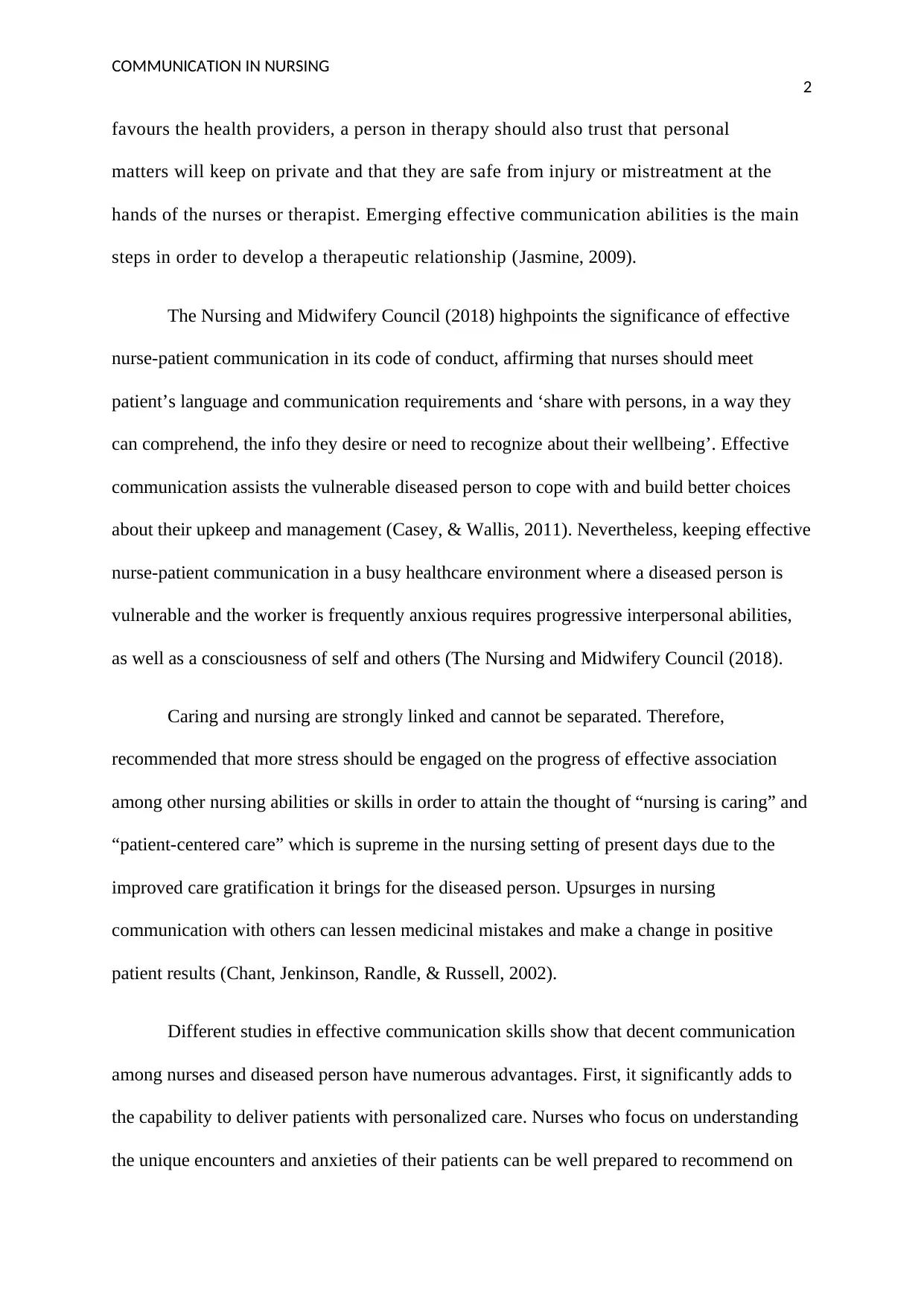
COMMUNICATION IN NURSING
2
favours the health providers, a person in therapy should also trust that personal
matters will keep on private and that they are safe from injury or mistreatment at the
hands of the nurses or therapist. Emerging effective communication abilities is the main
steps in order to develop a therapeutic relationship (Jasmine, 2009).
The Nursing and Midwifery Council (2018) highpoints the significance of effective
nurse-patient communication in its code of conduct, affirming that nurses should meet
patient’s language and communication requirements and ‘share with persons, in a way they
can comprehend, the info they desire or need to recognize about their wellbeing’. Effective
communication assists the vulnerable diseased person to cope with and build better choices
about their upkeep and management (Casey, & Wallis, 2011). Nevertheless, keeping effective
nurse-patient communication in a busy healthcare environment where a diseased person is
vulnerable and the worker is frequently anxious requires progressive interpersonal abilities,
as well as a consciousness of self and others (The Nursing and Midwifery Council (2018).
Caring and nursing are strongly linked and cannot be separated. Therefore,
recommended that more stress should be engaged on the progress of effective association
among other nursing abilities or skills in order to attain the thought of “nursing is caring” and
“patient-centered care” which is supreme in the nursing setting of present days due to the
improved care gratification it brings for the diseased person. Upsurges in nursing
communication with others can lessen medicinal mistakes and make a change in positive
patient results (Chant, Jenkinson, Randle, & Russell, 2002).
Different studies in effective communication skills show that decent communication
among nurses and diseased person have numerous advantages. First, it significantly adds to
the capability to deliver patients with personalized care. Nurses who focus on understanding
the unique encounters and anxieties of their patients can be well prepared to recommend on
2
favours the health providers, a person in therapy should also trust that personal
matters will keep on private and that they are safe from injury or mistreatment at the
hands of the nurses or therapist. Emerging effective communication abilities is the main
steps in order to develop a therapeutic relationship (Jasmine, 2009).
The Nursing and Midwifery Council (2018) highpoints the significance of effective
nurse-patient communication in its code of conduct, affirming that nurses should meet
patient’s language and communication requirements and ‘share with persons, in a way they
can comprehend, the info they desire or need to recognize about their wellbeing’. Effective
communication assists the vulnerable diseased person to cope with and build better choices
about their upkeep and management (Casey, & Wallis, 2011). Nevertheless, keeping effective
nurse-patient communication in a busy healthcare environment where a diseased person is
vulnerable and the worker is frequently anxious requires progressive interpersonal abilities,
as well as a consciousness of self and others (The Nursing and Midwifery Council (2018).
Caring and nursing are strongly linked and cannot be separated. Therefore,
recommended that more stress should be engaged on the progress of effective association
among other nursing abilities or skills in order to attain the thought of “nursing is caring” and
“patient-centered care” which is supreme in the nursing setting of present days due to the
improved care gratification it brings for the diseased person. Upsurges in nursing
communication with others can lessen medicinal mistakes and make a change in positive
patient results (Chant, Jenkinson, Randle, & Russell, 2002).
Different studies in effective communication skills show that decent communication
among nurses and diseased person have numerous advantages. First, it significantly adds to
the capability to deliver patients with personalized care. Nurses who focus on understanding
the unique encounters and anxieties of their patients can be well prepared to recommend on
⊘ This is a preview!⊘
Do you want full access?
Subscribe today to unlock all pages.

Trusted by 1+ million students worldwide
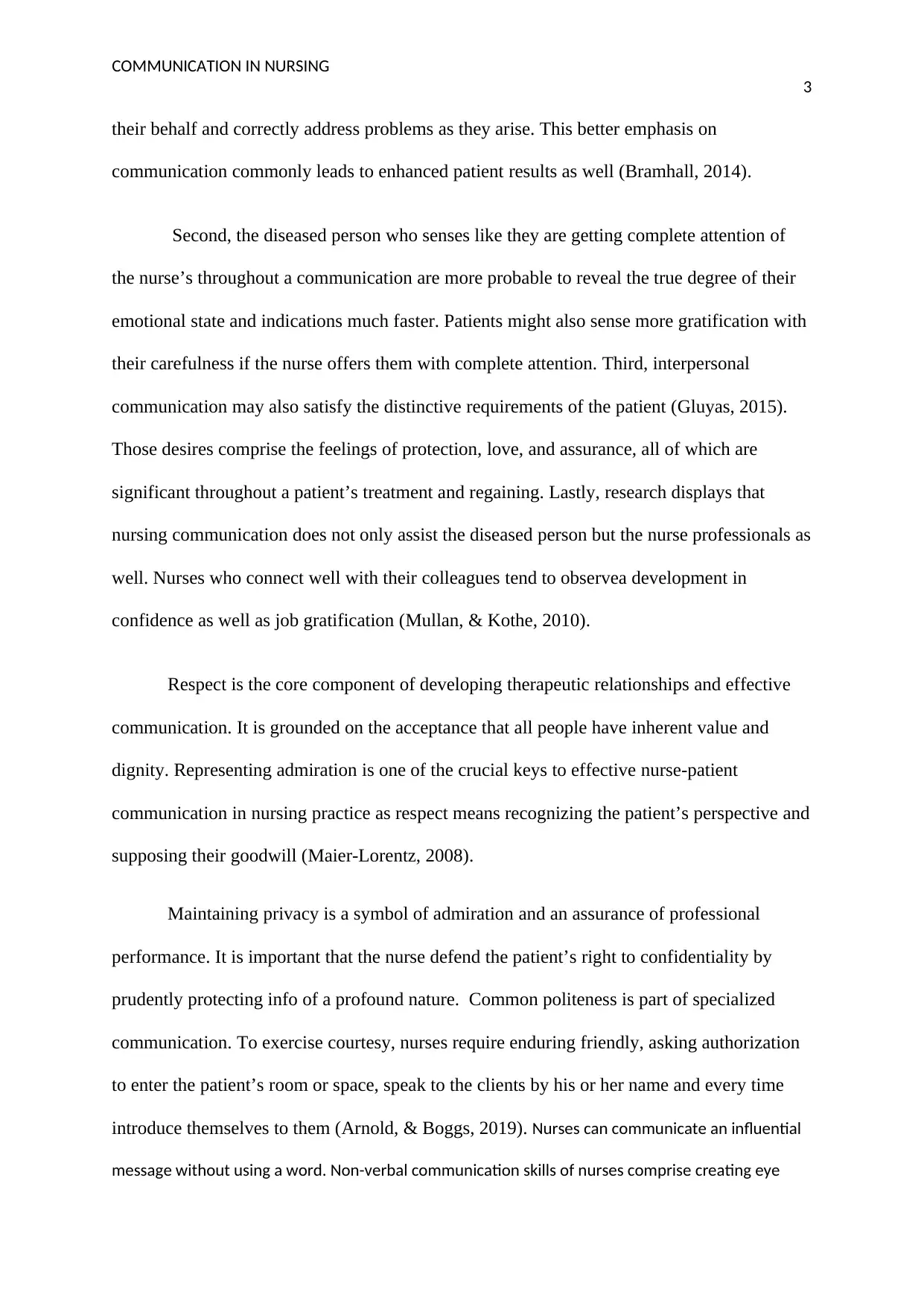
COMMUNICATION IN NURSING
3
their behalf and correctly address problems as they arise. This better emphasis on
communication commonly leads to enhanced patient results as well (Bramhall, 2014).
Second, the diseased person who senses like they are getting complete attention of
the nurse’s throughout a communication are more probable to reveal the true degree of their
emotional state and indications much faster. Patients might also sense more gratification with
their carefulness if the nurse offers them with complete attention. Third, interpersonal
communication may also satisfy the distinctive requirements of the patient (Gluyas, 2015).
Those desires comprise the feelings of protection, love, and assurance, all of which are
significant throughout a patient’s treatment and regaining. Lastly, research displays that
nursing communication does not only assist the diseased person but the nurse professionals as
well. Nurses who connect well with their colleagues tend to observea development in
confidence as well as job gratification (Mullan, & Kothe, 2010).
Respect is the core component of developing therapeutic relationships and effective
communication. It is grounded on the acceptance that all people have inherent value and
dignity. Representing admiration is one of the crucial keys to effective nurse-patient
communication in nursing practice as respect means recognizing the patient’s perspective and
supposing their goodwill (Maier-Lorentz, 2008).
Maintaining privacy is a symbol of admiration and an assurance of professional
performance. It is important that the nurse defend the patient’s right to confidentiality by
prudently protecting info of a profound nature. Common politeness is part of specialized
communication. To exercise courtesy, nurses require enduring friendly, asking authorization
to enter the patient’s room or space, speak to the clients by his or her name and every time
introduce themselves to them (Arnold, & Boggs, 2019). Nurses can communicate an influential
message without using a word. Non-verbal communication skills of nurses comprise creating eye
3
their behalf and correctly address problems as they arise. This better emphasis on
communication commonly leads to enhanced patient results as well (Bramhall, 2014).
Second, the diseased person who senses like they are getting complete attention of
the nurse’s throughout a communication are more probable to reveal the true degree of their
emotional state and indications much faster. Patients might also sense more gratification with
their carefulness if the nurse offers them with complete attention. Third, interpersonal
communication may also satisfy the distinctive requirements of the patient (Gluyas, 2015).
Those desires comprise the feelings of protection, love, and assurance, all of which are
significant throughout a patient’s treatment and regaining. Lastly, research displays that
nursing communication does not only assist the diseased person but the nurse professionals as
well. Nurses who connect well with their colleagues tend to observea development in
confidence as well as job gratification (Mullan, & Kothe, 2010).
Respect is the core component of developing therapeutic relationships and effective
communication. It is grounded on the acceptance that all people have inherent value and
dignity. Representing admiration is one of the crucial keys to effective nurse-patient
communication in nursing practice as respect means recognizing the patient’s perspective and
supposing their goodwill (Maier-Lorentz, 2008).
Maintaining privacy is a symbol of admiration and an assurance of professional
performance. It is important that the nurse defend the patient’s right to confidentiality by
prudently protecting info of a profound nature. Common politeness is part of specialized
communication. To exercise courtesy, nurses require enduring friendly, asking authorization
to enter the patient’s room or space, speak to the clients by his or her name and every time
introduce themselves to them (Arnold, & Boggs, 2019). Nurses can communicate an influential
message without using a word. Non-verbal communication skills of nurses comprise creating eye
Paraphrase This Document
Need a fresh take? Get an instant paraphrase of this document with our AI Paraphraser
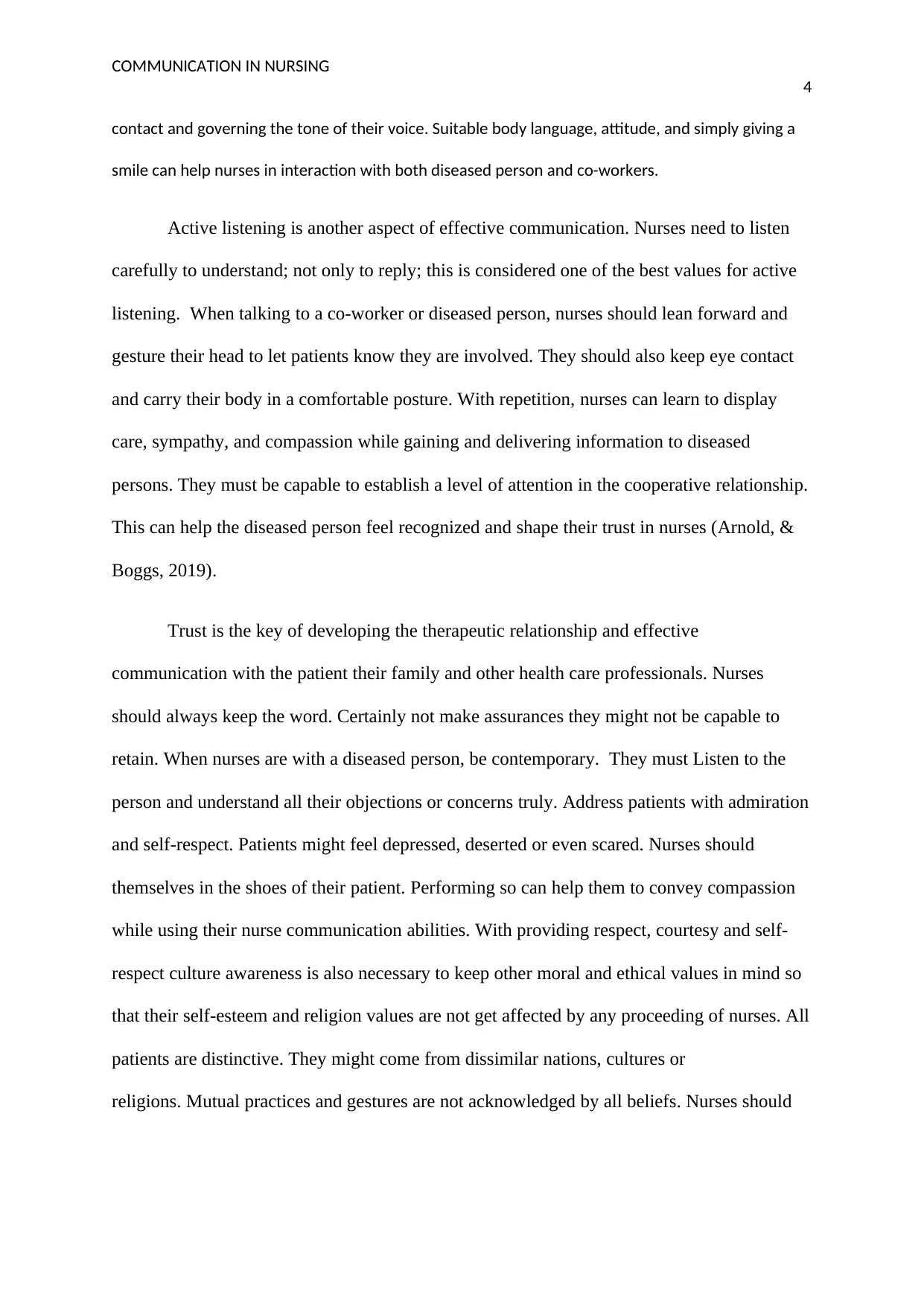
COMMUNICATION IN NURSING
4
contact and governing the tone of their voice. Suitable body language, attitude, and simply giving a
smile can help nurses in interaction with both diseased person and co-workers.
Active listening is another aspect of effective communication. Nurses need to listen
carefully to understand; not only to reply; this is considered one of the best values for active
listening. When talking to a co-worker or diseased person, nurses should lean forward and
gesture their head to let patients know they are involved. They should also keep eye contact
and carry their body in a comfortable posture. With repetition, nurses can learn to display
care, sympathy, and compassion while gaining and delivering information to diseased
persons. They must be capable to establish a level of attention in the cooperative relationship.
This can help the diseased person feel recognized and shape their trust in nurses (Arnold, &
Boggs, 2019).
Trust is the key of developing the therapeutic relationship and effective
communication with the patient their family and other health care professionals. Nurses
should always keep the word. Certainly not make assurances they might not be capable to
retain. When nurses are with a diseased person, be contemporary. They must Listen to the
person and understand all their objections or concerns truly. Address patients with admiration
and self-respect. Patients might feel depressed, deserted or even scared. Nurses should
themselves in the shoes of their patient. Performing so can help them to convey compassion
while using their nurse communication abilities. With providing respect, courtesy and self-
respect culture awareness is also necessary to keep other moral and ethical values in mind so
that their self-esteem and religion values are not get affected by any proceeding of nurses. All
patients are distinctive. They might come from dissimilar nations, cultures or
religions. Mutual practices and gestures are not acknowledged by all beliefs. Nurses should
4
contact and governing the tone of their voice. Suitable body language, attitude, and simply giving a
smile can help nurses in interaction with both diseased person and co-workers.
Active listening is another aspect of effective communication. Nurses need to listen
carefully to understand; not only to reply; this is considered one of the best values for active
listening. When talking to a co-worker or diseased person, nurses should lean forward and
gesture their head to let patients know they are involved. They should also keep eye contact
and carry their body in a comfortable posture. With repetition, nurses can learn to display
care, sympathy, and compassion while gaining and delivering information to diseased
persons. They must be capable to establish a level of attention in the cooperative relationship.
This can help the diseased person feel recognized and shape their trust in nurses (Arnold, &
Boggs, 2019).
Trust is the key of developing the therapeutic relationship and effective
communication with the patient their family and other health care professionals. Nurses
should always keep the word. Certainly not make assurances they might not be capable to
retain. When nurses are with a diseased person, be contemporary. They must Listen to the
person and understand all their objections or concerns truly. Address patients with admiration
and self-respect. Patients might feel depressed, deserted or even scared. Nurses should
themselves in the shoes of their patient. Performing so can help them to convey compassion
while using their nurse communication abilities. With providing respect, courtesy and self-
respect culture awareness is also necessary to keep other moral and ethical values in mind so
that their self-esteem and religion values are not get affected by any proceeding of nurses. All
patients are distinctive. They might come from dissimilar nations, cultures or
religions. Mutual practices and gestures are not acknowledged by all beliefs. Nurses should

COMMUNICATION IN NURSING
5
consider the movements and make every effort for cultural consciousness every time they
interact with the patient.
This nurse interaction skill is at the centre of the nursing profession. They must be
capable to explain sickness processes, medicines, and self-care methods to the sufferer and
their family members. Break down medical terminology into modest terms. Education should
be collaborative. Ask patients questions and use teach-back techniques when possible
(McCabe, & Timmins, 2013). Nurses in headship situations are not the lone ones who require
this skill. They might be asked to present to other nurses or staff associates on a minor or big
scale. Nurses should Plan their message. Generate pleasing graphic aids that enhance worth
to the presentation. They must know their audience and comprehend what they need from the
presentation. Verbal communication abilities are of the greatest importance. Nurses should
always consider their spectators or patients. Speak in perfect, whole sentences and consider
their tone when talking (Arnold, & Boggs, 2019).
This report has developed a clear understanding of why effective communication
skills are essential for nurses and what skills they need to implement in their practice to
provide good health services. Effective communication is the heart of medical services in
every health care setting. To assess the patient positively and easily nurses need to build a
therapeutic relationship with them and effective communication the key to achieve this goal.
Effective communication skills are necessary to build trust in the patient for the setting. By
applying this technique, it becomes easy to make the patients feel protective and free to
discuss their actual situation and feelings. By providing respect, privacy, confidentiality, and
courtesy to the patient a nurse can build effective communication with the diseased person.
Some of the skills necessary to enhance communication skills includes; non-verbal
communication, active listening, building trust, being culturally aware, educating patients,
5
consider the movements and make every effort for cultural consciousness every time they
interact with the patient.
This nurse interaction skill is at the centre of the nursing profession. They must be
capable to explain sickness processes, medicines, and self-care methods to the sufferer and
their family members. Break down medical terminology into modest terms. Education should
be collaborative. Ask patients questions and use teach-back techniques when possible
(McCabe, & Timmins, 2013). Nurses in headship situations are not the lone ones who require
this skill. They might be asked to present to other nurses or staff associates on a minor or big
scale. Nurses should Plan their message. Generate pleasing graphic aids that enhance worth
to the presentation. They must know their audience and comprehend what they need from the
presentation. Verbal communication abilities are of the greatest importance. Nurses should
always consider their spectators or patients. Speak in perfect, whole sentences and consider
their tone when talking (Arnold, & Boggs, 2019).
This report has developed a clear understanding of why effective communication
skills are essential for nurses and what skills they need to implement in their practice to
provide good health services. Effective communication is the heart of medical services in
every health care setting. To assess the patient positively and easily nurses need to build a
therapeutic relationship with them and effective communication the key to achieve this goal.
Effective communication skills are necessary to build trust in the patient for the setting. By
applying this technique, it becomes easy to make the patients feel protective and free to
discuss their actual situation and feelings. By providing respect, privacy, confidentiality, and
courtesy to the patient a nurse can build effective communication with the diseased person.
Some of the skills necessary to enhance communication skills includes; non-verbal
communication, active listening, building trust, being culturally aware, educating patients,
⊘ This is a preview!⊘
Do you want full access?
Subscribe today to unlock all pages.

Trusted by 1+ million students worldwide

COMMUNICATION IN NURSING
6
developing presentation skills, and improving verbal communication. These skills might help
not only the nurse but also the patient.
References
Arnold, E. C., & Boggs, K. U. (2019). Interpersonal Relationships E-Book: Professional
Communication Skills for Nurses. Saunders.
Arnold, E. C., & Boggs, K. U. (2019). Interpersonal Relationships E-Book: Professional
Communication Skills for Nurses. Saunders.
Bramhall, E. (2014). Effective communication skills in nursing practice. Nursing Standard
(2014+), 29(14), 53.
Casey, A., & Wallis, A. (2011). Effective communication: Principle of Nursing Practice
E. Nursing Standard, 25(32).
Chant, S., Jenkinson, T. I. M., Randle, J., & Russell, G. (2002). Communication skills: some
problems in nursing education and practice. Journal of clinical nursing, 11(1), 12-21.
Gluyas, H. (2015). Effective communication and teamwork promote patient safety. Nursing
Standard (2014+), 29(49), 50.
Jasmine, T. J. X. (2009). The use of effective therapeutic communication skills in nursing
practice. Singapore Nursing Journal, 36(1).
Maier-Lorentz, M. M. (2008). Transcultural nursing: Its importance in nursing
practice. Journal of cultural diversity, 15(1), 37-43.
McCabe, C., & Timmins, F. (2013). Communication skills for nursing practice. Macmillan
International Higher Education.
6
developing presentation skills, and improving verbal communication. These skills might help
not only the nurse but also the patient.
References
Arnold, E. C., & Boggs, K. U. (2019). Interpersonal Relationships E-Book: Professional
Communication Skills for Nurses. Saunders.
Arnold, E. C., & Boggs, K. U. (2019). Interpersonal Relationships E-Book: Professional
Communication Skills for Nurses. Saunders.
Bramhall, E. (2014). Effective communication skills in nursing practice. Nursing Standard
(2014+), 29(14), 53.
Casey, A., & Wallis, A. (2011). Effective communication: Principle of Nursing Practice
E. Nursing Standard, 25(32).
Chant, S., Jenkinson, T. I. M., Randle, J., & Russell, G. (2002). Communication skills: some
problems in nursing education and practice. Journal of clinical nursing, 11(1), 12-21.
Gluyas, H. (2015). Effective communication and teamwork promote patient safety. Nursing
Standard (2014+), 29(49), 50.
Jasmine, T. J. X. (2009). The use of effective therapeutic communication skills in nursing
practice. Singapore Nursing Journal, 36(1).
Maier-Lorentz, M. M. (2008). Transcultural nursing: Its importance in nursing
practice. Journal of cultural diversity, 15(1), 37-43.
McCabe, C., & Timmins, F. (2013). Communication skills for nursing practice. Macmillan
International Higher Education.
Paraphrase This Document
Need a fresh take? Get an instant paraphrase of this document with our AI Paraphraser
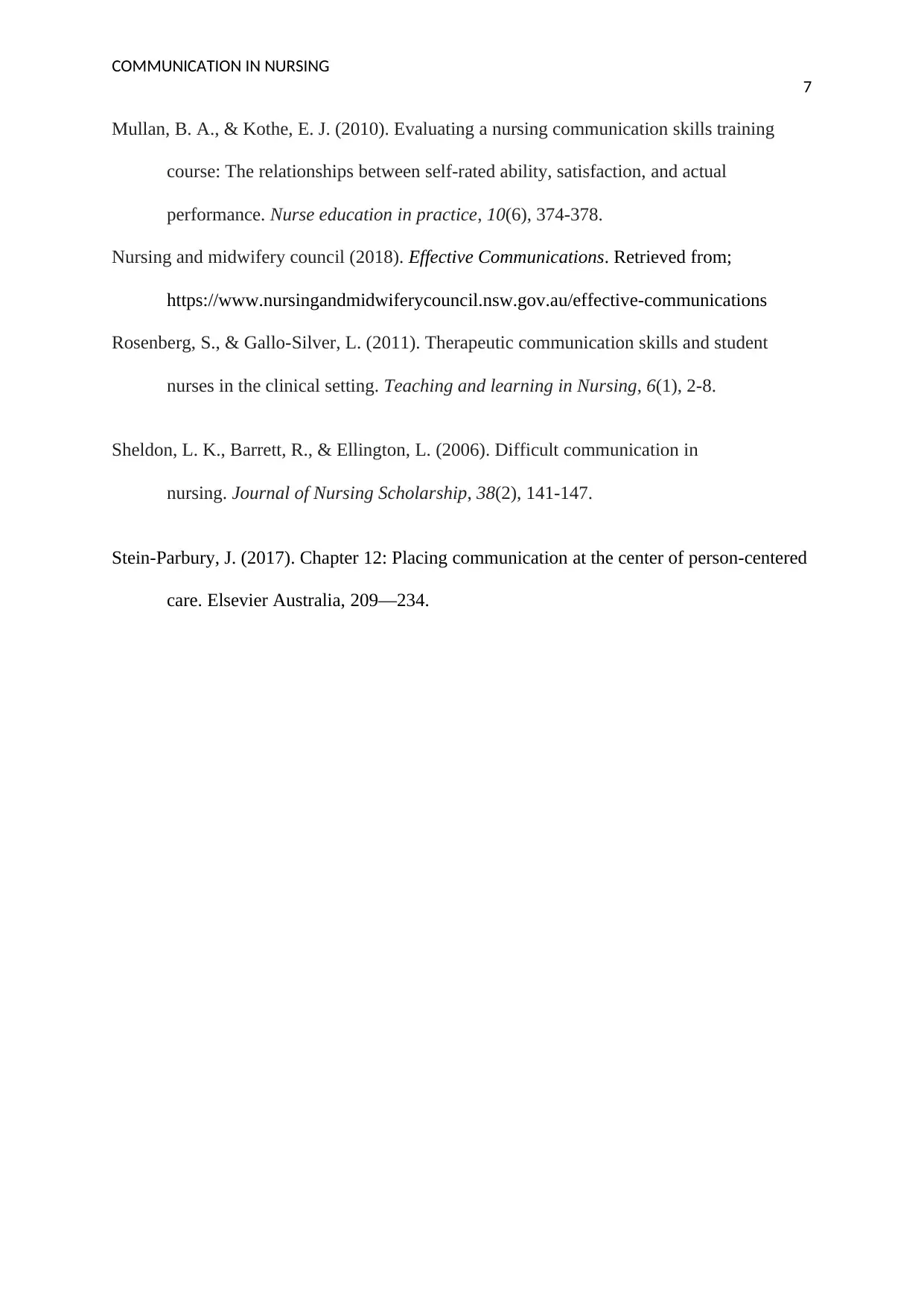
COMMUNICATION IN NURSING
7
Mullan, B. A., & Kothe, E. J. (2010). Evaluating a nursing communication skills training
course: The relationships between self-rated ability, satisfaction, and actual
performance. Nurse education in practice, 10(6), 374-378.
Nursing and midwifery council (2018). Effective Communications. Retrieved from;
https://www.nursingandmidwiferycouncil.nsw.gov.au/effective-communications
Rosenberg, S., & Gallo-Silver, L. (2011). Therapeutic communication skills and student
nurses in the clinical setting. Teaching and learning in Nursing, 6(1), 2-8.
Sheldon, L. K., Barrett, R., & Ellington, L. (2006). Difficult communication in
nursing. Journal of Nursing Scholarship, 38(2), 141-147.
Stein-Parbury, J. (2017). Chapter 12: Placing communication at the center of person-centered
care. Elsevier Australia, 209—234.
7
Mullan, B. A., & Kothe, E. J. (2010). Evaluating a nursing communication skills training
course: The relationships between self-rated ability, satisfaction, and actual
performance. Nurse education in practice, 10(6), 374-378.
Nursing and midwifery council (2018). Effective Communications. Retrieved from;
https://www.nursingandmidwiferycouncil.nsw.gov.au/effective-communications
Rosenberg, S., & Gallo-Silver, L. (2011). Therapeutic communication skills and student
nurses in the clinical setting. Teaching and learning in Nursing, 6(1), 2-8.
Sheldon, L. K., Barrett, R., & Ellington, L. (2006). Difficult communication in
nursing. Journal of Nursing Scholarship, 38(2), 141-147.
Stein-Parbury, J. (2017). Chapter 12: Placing communication at the center of person-centered
care. Elsevier Australia, 209—234.
1 out of 8
Related Documents
Your All-in-One AI-Powered Toolkit for Academic Success.
+13062052269
info@desklib.com
Available 24*7 on WhatsApp / Email
![[object Object]](/_next/static/media/star-bottom.7253800d.svg)
Unlock your academic potential
Copyright © 2020–2025 A2Z Services. All Rights Reserved. Developed and managed by ZUCOL.





